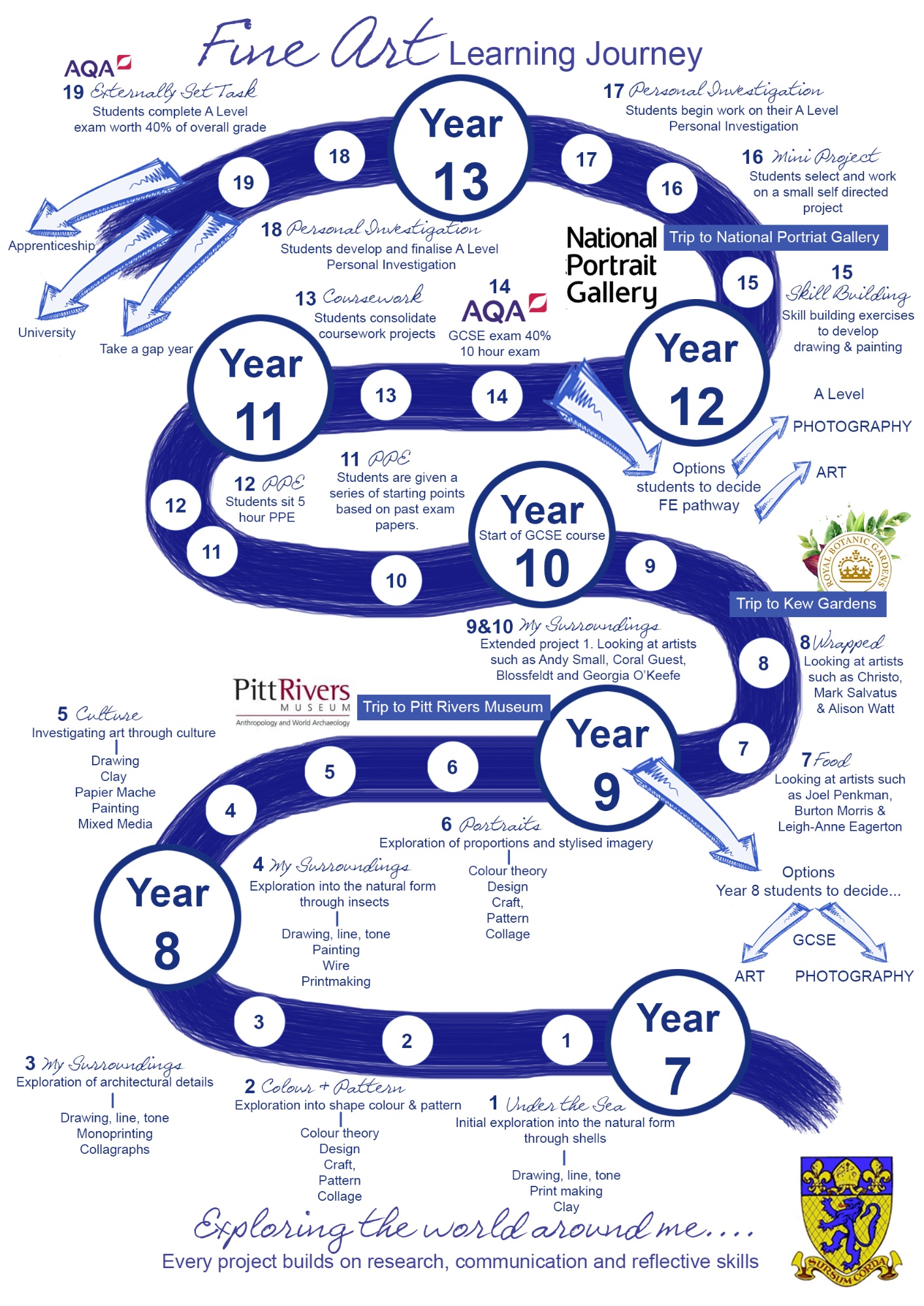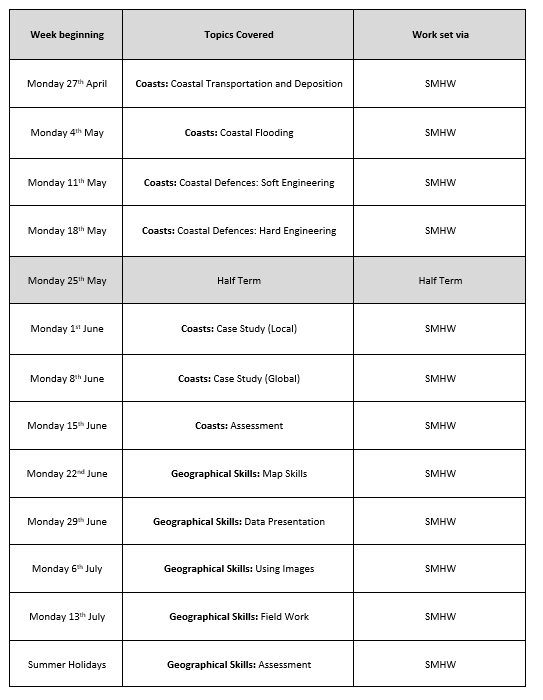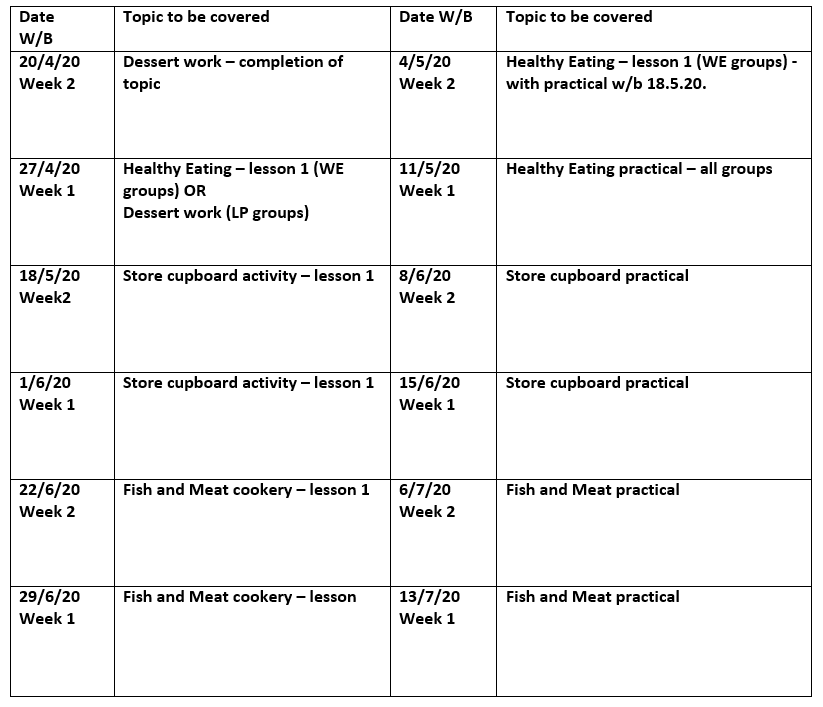Year 8 Curriculum
English
Term 1 - The Romantics
Romantic poetry
Term 2 - Comparing texts
19th century non-fiction
Term 3 - WWI Poetry
Poets of WWI
Term 4 & 5 - The modern novel
A modern novel based on a Shakespeare text
Term 6
Text into moving image – exploring how texts are adapted for the big and small screen
Maths
Year 8 Maths Curriculum 2021-2020
Number
1 Factors and Multiples
1.1 Primes, Prime Factorisation and Index Notation
1.2 Highest Common Factor (HCF)
1.3 Lowest Common Multiple (LCM)
1.4 Powers & Roots
Number
2 Approximation and Estimation
2.1 Rounding Methods
Ratio
3 Ratio rate and Speed
3.1 Ratio calculation and simplification
3.4 Rate (one quantity per unit of another quantity – “best buy”).
Number
4 Percentages
4.1 Expressing a percentage as a fraction or a decimal,
Fraction of an amount leading to Percentage of an amount.
Algebra
5 Algebraic Expressions Formulae
5.1 Use of Letters in Algebra
5.2 Evaluation of Algebraic Expressions and Formulae
5.3 Algebraic Expressions in the Real World
5.4 Simplification methodologies for Linear Expressions
Algebra
6 Equations and Inequalities in one variable
6.1 Linear Equations in One Variable
6.3 Forming Linear Equations to Solve Problems
Algebra
7 Coordinates and Linear Functions
7.1 Cartesian coordinate system (plotting coordinates in all 4 quadrants)
7.2 Idea of a Function using function machines
Geometry
8.3 Parallel lines and Transversals
8.4 Triangles, classification, angle sum, exterior angle.
Geometry
10 Perimeter and Area of Parallelograms and Trapezia
10.1 Area of Parallelograms
10.2 Area of Trapezia
10.3 Perimeter and Area of Composite Plane Figures
Geometry
11 Volume and Surface area of Prisms and Cylinders
11.1 Views and Nets of Three-dimensional (3D) Shapes
11.2 Volume and Total Surface Area of Prisms
Statistics
12 Statistical Graphs
12.1 Various Graphical representations
Science
We follow the AQA Activate study programme, consisting of 10 ‘big ideas’ taught in both year 7 and 8.
In year 8, we follow Activate 2. The pupils can access the textbook for this on Kerboodle. Class teachers will also often set interactive tasks and homework using the Kerboodle system, to encourage independent learning and to use technology to provide feedback to students.
In the Autumn/Winter term, all students will cover the following topics;
- Biology – Organisms Part 2
- Chemistry – Matter Part 2
- Physics – Energy Part 2 + Waves Part 2
In the Spring term, all students will cover the following topics;
- Biology – Genes Part 2
- Chemistry – Reactions Part 2
- Physics – Forces Part 2
In the Summer term, all students will cover the following topics;
- Biology – Ecosystems Part 2
 Chemistry – Earth Part 1 and Part 2
Chemistry – Earth Part 1 and Part 2 Physics – Electromagnets Part 1 and Part 2
Physics – Electromagnets Part 1 and Part 2
Every topic will finish with an end of topic test, and a lesson to reflect on the student’s progress and identify any areas that need revisiting. Our curriculum means that we are always revisiting topics to build on the foundations so will be able to pick up anything that pupils are finding tricky.
Science
History
Students finish their unit on Britain 1745-1901 by investigating their final theme:
Key Theme 3: How did Britain exploit the rest of the world?
- Who were the empire builders?
- What were the rewards and dangers of being a merchant trader?
- Did everyone benefit from the British Empire?
From October, students start their next unit on the history of black Americans by investigating the following key questions:-
- What are the key features of the history of black Americans?
- How well connected was early modern Africa?
- Can you learn about Kongo in an hour?
- Was the Transatlantic slave trade worse than other slavery?
- How did the triangular trade work?
- Can Hollywood really tell us about the slave trade?
- How useful are our sources for an enquiry into the Middle Passage?
- What was life like on a slave plantation?
- Why did Britain abolish the slave trade in 1807?
- Was Wilberforce really the hero of abolition?
- What were the arguments for and against slavery in the USA?
- What was the experience of black Americans in the American Civil War?
- From emancipation to segregation: to what extent did black people achieve equality?
After Christmas, students study The World Since 1901:
Key Theme 1: The era of World War One: the war to end all wars?
- What would you include in a 30 second news bulletin to explain why World War One started?
- Why did Clara Haber kill herself?
- What were conditions like in the trenches?
- How can we check whether WW1 photos are the real thing?
- Why did Sarah Barnes campaign to get her son’s name engraved on Littlehampton war memorial?
- How significant was World War One?
- Was the Treaty of Versailles a mistake?
- What was Britain like in the 1930s?
Key Theme 2: How have wars affected civilians?
- What precautions should Britain make for war?
- What should the government do about evacuation?
- What was evacuation like for people?
- Was the bombing of Hiroshima and Nagasaki justified?
Key Theme 3: How have people suffered persecution during the 20th century?
- What can a song tell us about life in a Nazi Labour Camp?
- Was the Holocaust inevitable?
- Should the film Gandhi lose its Oscars?
- What happened during the Salt March?
- Was London the place to be in the 1950s and 1960s for the Windrush immigrants?
Those students continuing History will complete this course in the Autumn Term of Year 9 by looking at persecution in South Africa and examples of genocide in countries like Rwanda, Bosnia and Cambodia.
Languages
French
Year 8 French Outline of Work Summer Term 2020
Work will be set on each of the following themes in various forms, but most likely a PowerPoint or a worksheet that will specify notes that need to be copied into exercise books and will include a variety of tasks that need to be completed and self-corrected with an answer sheet.
Regular vocab learning will also be set as well as Duolingo once a fortnight.
Disney project:
- Past tense lesson
Ma vie (My life):
- Morning routine + reflexive verbs
- Arranging to go out (on pourrait) + accepting/refusing invitations
- Cinema - types of films + opinions
Temps libre (Free time):
- Talk about what you do after school - present tense
- Talk about what you did last weekend / yesterday – perfect tense avoir verbs only
- Talk about where you have been / stayed – perfect tense être verbs
German
Year 8 German Outline of summer term learning
Introducing different types of TV programmes and opinions on them
- TV viewing habits – including perfect tense
- After school activities – reinforcing hobbies and time phrases
- Discussing Class trip (reinforce perfect tense here – so crucial for GCSE)
- Body parts (introduce possessive adjectives)
- Illnesses - describing what might be wrong with you
- Remedies – including scenario at chemist / doctor
Spanish
Year 8 Spanish Outline of Work Summer Term 2020
Work will be set on each of the following themes in various forms, but most likely a PowerPoint/Googleslide or a worksheet that will specify notes that need to be copied into exercise books and will include a variety of tasks that need to be completed and self-corrected with an answer sheet.
Regular vocab learning will also be set as well as Duolingo / Memrise once a fortnight.
Module 4: La comida y la bebida – food and drink
- Saying what you like to eat and drink
- Look at the differences between Spanish and English mealtimes
- Say what you have for breakfast, lunch, snack and dinner
- Say what your favourite meal is / Describe a special meal
- Buy fruit and veg at the market to make a Spanish meal
Module 5: La ropa y la moda – clothes and fashion
- Revision of food and other items and different shops
- Give opinions about clothes
- Say what you wear for different occasions (present tense)
- Describe an outfit that like to wear (extend detail)
- Learn how to buy clothes in Spain
- Ask to try something on
Chinese
Year 8 Chinese Outline of Work Summer Term 2020
Work will be set on each of the following themes in various forms, but most likely a PowerPoint or a worksheet that will specify notes that need to be copied into exercise books and will include a variety of tasks that need to be completed and self-corrected with an answer sheet.
Regular vocab learning will also be set as well as Quizlet once a fortnight.
From textbook of Jinbu 2
假期 (Holiday):
- First lesson will be talking about the weather, using different time frames.
- Second lesson is around the world, as we already learned this, so will be just a quickly revise of talking about different countries and languages
- I like the seaside. Talk about where you like to go for your holiday
- My world tour. Learning transport.
- I went to China. Using past time marks to talk about where you went on holiday in the past.
- Extension, review, revision & test.
我 (All about me!)
- I am tall! (Describing people’s appearance using verb- adjectives.
- This is my bedroom (describe your room)
- Her shoes are blue. (talk about clothes and colours.)
- I get up at 7 o’clock (talking about your daily routine)
- Daily life and clothes in China. ( Learning about teenager’s life in China)
- Extension, review, revision and test
你家在哪儿 (Where do you live?)
- My town. (Talking about places in your town)
- Where shall we meet? (Learn to use relative places words and directions)
- Weekend plan. (Using future time phrases to talk about weekend plans)
- My house. (Describing your house using comparisons)
- Extension, review, revision and test
Religious Education
Topic 1: Hinduism
Lesson 1 - Hindu Key beliefs
Lesson 2 - Karma and Reincarnation
Lesson 3 - Scriptures
Lesson 4 - Symbolism and the Hindu Temple
Lesson 5 - Hindu worship and the Temple at Home
Lesson 6 - 4 Stages of Life in Hinduism
Lesson 7 - Hindu Festivals
Design and Technology
Due to the nature of the Design & Technology course it is, unfortunately, not possible for students to complete the same content that they would have studied in school at home. We will therefore set a number of different mini design tasks that will enable the students to develop the same creative and problem-solving skills at home. We will try and make these tasks as flexible as possible as we appreciate that students may be limited by the resources available at home.
If possible, students should submit evidence of the work that they have produced online via SMHW.
Each mini design task will focus on developing the following skills:
Key stage 3
Through a variety of creative and practical activities, pupils should be develop the knowledge, understanding and skills needed to engage in an iterative process of designing and making.
Design
Use research and exploration to identify and understand user needs.
Identify and solve their own design problems and understand how to reformulate problems given to them.
Develop and communicate design ideas using annotated sketches.
Make
Select from and use a range of materials taking into account their properties. (we understand that students will not have access to materials, but they should still consider material properties when designing)
Evaluate
Test, evaluate and refine their ideas and products.
Other Resources Available:

Focus e-learning – This gives access to a number of online resources that can be accessed via a smartphone, tablet or computer. The relevant Focus e-learning link will be included on the tasks set on SMHW as this can only be accessed via the school’s licence.

SolidWorks 3D CAD modelling – CAD modelling can help develop skills that apply to a number of different industries including product design, architecture, engineering, computer game design and animation to name just a few. If any students would like to develop their 3D modelling skills at home please email Mr Smith (smithm@piggottschool.org) from their school email account and he will send the download instructions and licence details. Unfortunately, this is only available on PC and doesn’t work on a Mac.
Computer Science
Advanced Computational Thinking
Advanced Data Representation
Wesbite Design
Art
Portraits: Exploration of proportions and stylised imagery. Skills to be developed are, drawing, colour theory, design, craft, pattern & collage.
Culture: Investigating art through culture. Skills to be developed are, drawing, painting, mixed media, 3D skills.
My Surroundings: Exploration into the natural form through insects. Skills to be developed are, Drawings, line, tone, paining, printmaking and 3D skills.

Drama
AUTMN TERM
1st Half-Term
Introduction to Year 8 Drama / Macbeth - Relationships & Choices
Students will recap on their study of Drama in Year 7 through a range of activities: practical and theory.
They will then be studying Macbeth (William Shakespeare) focusing on the plot, themes, stock characters of Macbeth and Lady Macbeth and the choices that they make.
At the end of the half-term there will be a consolidation quiz (set on SMHW) testing their acquired knowledge about all that they have learnt.
2nd Half-Term
Live Theatre / Theatre Crafts: Peter Pan
Students will develop their knowledge and understanding of different theatre crafts (set design, costume, acting, lighting and sound) through watching live theatre.
Students will analyse and evaluate the National Theatre’s production of ‘Peter Pan’ and use it as a stimulus to create their own work.
At the end if the half-term, students will write a theatre review of the production to consolidate their learning.
Any queries please contact Mrs Tomo tomom@piggottschool.org
P.E.
Core PE
During this time it is important that students keep themselves active. In order to support students with this we will set a weekly physical challenge which will cover the different components of fitness:
- Strength
- Speed
- Agility
- Balance
- Cardio Vascular endurance (aerobic power)
- Coordination
- Flexibility
- Muscular Endurance
- Power (anaerobic power)
- Reaction time
Alongside this we will be setting quizzes which will cover the following areas:
- Health and Fitness
- The body and how it works in relation to exercise
- Types of exercise
- Effects of exercise on the body
- Types of training
- Nutrition
- Fitness Testing
- Contemporary issues in sport
Students will also find further challenges on the PE twitter page @PiggottPE
There are many workout videos available on the internet including:
Body Coach
https://www.youtube.com/channel/UCAxW1XT0iEJo0TYlRfn6rYQ
Just Dance
https://www.youtube.com/channel/UChIjW4BWKLqpojTrS_tX0mg
Jessica Ennis
https://www.youtube.com/channel/UC393OqpmGADkrvWBDE2-Jcg
Youth Sports Trust
https://www.youtube.com/user/YouthSportTrust/videos
Food and Nutrition
Your lessons are once a fortnight so work will usually be set to cover 2 lessons - you can decide which order to complete the theory based task and the practical task.
You may need to adapt recipes/ quantities/ ingredients but have a go, please send photos of your practical tasks as they are great to see!
A plan of your home learning is as follows: depending when your lesson should take place, your teacher will set the work on SMHW.


